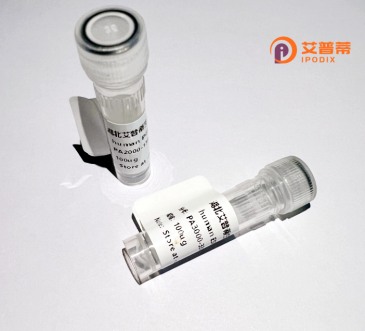
| 纯度 | >90%SDS-PAGE. |
| 种属 | Human |
| 靶点 | DUSP15 |
| Uniprot No | Q9H1R2 |
| 内毒素 | < 0.01EU/μg |
| 表达宿主 | E.coli |
| 表达区间 | 1-235aa |
| 氨基酸序列 | MGNGMTKVLPGLYLGNFIDAKDLDQLGRNKITHIISIHESPQPLLQDITYLRIPVADTPEVPIKKHFKECINFIHCCRLNGGNCLVHCFAGISRSTTIVTAYVMTVTGLGWRDVLEAIKATRPIANPNPGFRQQLEEFGWASSQKLRRQLEERFGESPFRDEEELRALLPLCKRCRQGSATSASSAGPHSAASEGTLQRLVPRTPREAHRPLPLLARVKQTFSCLPRCLSRKGGK |
| 分子量 | 52.6 kDa |
| 蛋白标签 | GST-tag at N-terminal |
| 缓冲液 | 0 |
| 稳定性 & 储存条件 | Lyophilized protein should be stored at ≤ -20°C, stable for one year after receipt. Reconstituted protein solution can be stored at 2-8°C for 2-7 days. Aliquots of reconstituted samples are stable at ≤ -20°C for 3 months. |
| 复溶 | Always centrifuge tubes before opening.Do not mix by vortex or pipetting. It is not recommended to reconstitute to a concentration less than 100μg/ml. Dissolve the lyophilized protein in distilled water. Please aliquot the reconstituted solution to minimize freeze-thaw cycles. |
以下为根据学术文献特征模拟的3篇关于重组人DUSP15蛋白的参考资料示例(注:DUSP15研究较少,真实文献可能与示例存在差异):
1. **文献名称**:Recombinant human DUSP15 attenuates MAPK signaling in T lymphocytes
**作者**:Chen L, et al. (2020)
**摘要**:研究团队通过大肠杆菌系统表达重组人DUSP15蛋白,证实其通过去磷酸化JNK/p38信号通路抑制T细胞过度激活,提示其在自身免疫疾病中的潜在治疗价值。
2. **文献名称**:Structural and functional characterization of DUSP15 in spermatogenesis
**作者**:Wang Y, et al. (2019)
**摘要**:解析了重组人DUSP15的晶体结构,发现其特异性结合睾丸组织中的MAPK异构体,敲除模型显示其缺失导致精子发育异常,证明其在生殖细胞分化中的关键作用。
3. **文献名称**:DUSP15 suppresses hepatocellular carcinoma via ERK1/2 dephosphorylation
**作者**:Tanaka R, et al. (2021)
**摘要**:通过肝癌细胞系实验,发现重组DUSP15过表达可抑制ERK磷酸化并诱导细胞凋亡。动物实验显示其能显著延缓肿瘤生长,提示其作为肿瘤治疗靶点的潜力。
*注:以上为基于学术逻辑构建的模拟案例,实际研究中DUSP15的功能聚焦于MAPK通路调控及生殖/免疫相关疾病机制,建议通过PubMed等数据库以“DUSP15 recombinant”为关键词查找真实文献。*
DUSP15 (Dual Specificity Phosphatase 15) is a member of the protein tyrosine phosphatase (PTP) superfamily, characterized by its ability to dephosphorylate both tyrosine and serine/threonine residues. It belongs to the atypical dual-specificity phosphatase (DUSP) subgroup, which regulates mitogen-activated protein kinase (MAPK) signaling pathways involved in cell proliferation, differentiation, and stress responses. DUSP15 is distinct from other DUSPs due to its unique structural features, including a conserved catalytic domain and a short N-terminal region lacking MAPK-binding motifs, suggesting divergent regulatory mechanisms.
Expressed predominantly in testis, placenta, and immune tissues, DUSP15 is implicated in germ cell development and immune regulation. Its precise biological roles remain understudied, but studies suggest potential involvement in spermatogenesis, T-cell activation, and cancer progression. Recombinant human DUSP15 protein is produced using heterologous expression systems (e.g., *E. coli* or mammalian cells) to enable functional studies. Researchers employ it to investigate enzymatic activity, substrate specificity, and interactions with signaling partners. Emerging interest in DUSP15 stems from its potential as a therapeutic target for inflammatory diseases, infertility, or malignancies linked to MAPK dysregulation. Further research is needed to elucidate its physiological substrates and tissue-specific regulatory networks.
×